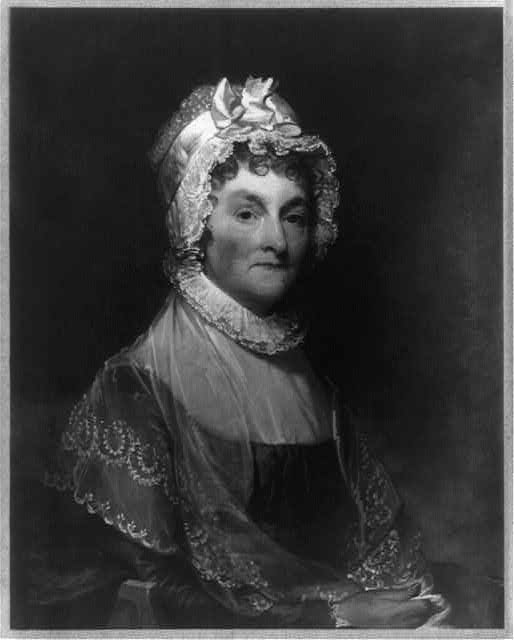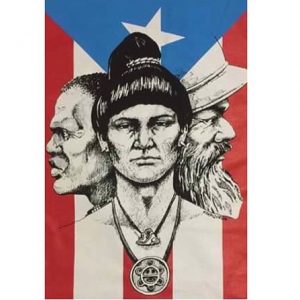Too often in society women are belittled because of their gender, despite their numerous abilities and achievements. Women all over the world fall victims, and struggle to become survivors, of inequality against their male counterparts. Although some improvements have been made over time, there is still much progress to be done in order to establish an equality between men and women in all aspects of life, not just in a few token areas. During the eighteenth century, a few women became advocates for women’s rights and fought for individual freedoms that were attainable for men but rarely for women. One of these advocates was Abigail Adams, first lady to the second President, John Adams. Abigail, a devout wife and American citizen, was more than just a first lady to the president. She was an early feminist voice who refused to stand by and allow women to be suppressed of their capabilities and their rights.
In order to comprehend why Abigail felt so strongly and fought so vigorously for her beliefs, it is important first to understand how her beliefs became rooted. Abigail was the second out of four children from William Smith and Elizabeth Quincy. Her father was a minister of North Parish Congregational Church of Weymouth in Massachusetts colony; her mother Elizabeth was a typical housewife and mother. Abigail was fortunate enough to be born into such an eminent family in New England with a prosperous lineage of statesman, ministers, and merchants. She was raised in a household that wholeheartedly affirmed the beliefs of rational Puritanism, a solid Christian faith, and a strong education.1

From an early age, Abigail was introduced to the limitations of women by being unable to attend school. Growing up in the eighteenth century, education was highly sought after; however, education was primarily for boys, not girls. Boys had the opportunity to study various subjects, such as Latin, math, French, literature, and Greek. Elite families often prepared their boys to receive a higher education, either at Harvard College or abroad. Since girls were not permitted to attend school, Abigail was educated at home. Though her education did include some rudimentary training in academic areas such as reading and writing, most of her education focused on becoming a traditional housewife and mother. She observed her mother in common domestic skills such as sewing, cooking, and home maintenance.2
Her most significant influence occurred around the time of the Revolutionary War, which was a time of extreme stress and chaos for the young republic. This was a time when participation of every American became absolutely imperative in order to win not only the war, but also to restructure the country afterwards. Despite the circumstances, the social conditions for women went largely unchanged. During the Revolutionary War, while many of the men were away serving the war effort, the women were left in charge of the businesses and farms. The towns and cities were left with impoverished women who were often driven to lead protests and riots against price increases, as well as resorting to looting for food. In other parts of the country, women began to fight back against British troops, whom they were forced to quarter during the war. Some women either by choice, force, or desperation, traveled to the Patriot army camps to live with their male relatives.3
After the women began migrating to the camps, many men became hostile and voiced brutal complaints against the women. One man even expressed a barbarous comment about women, claiming “their falling, their brows beady with the heat, their belongings, slung over one shoulder, chattering and yelling in sluttish shrills as they went.”4 George Washington himself even believed the females to be disruptive and a distraction to the troops. In reality, women were actually a great asset and made major contributions towards the war effort. Most women performed domestic duties such as cooking, laundry, nursing, and even boosting the morale of the soldiers. Some women went beyond the normal expectations and became involved in the combat.5
By the end of the war, the views and standards of women had remained the same as at the outset. Many women began to question their place in society, including Abigail Adams. As early as March 31, 1776, while her husband was in Philadelphia forming a new government, Abigail wrote a letter to her husband, John, imploring him to expand women’s rights to become equal with the rights of men:
I long to hear that you have declared an independancy—and by the way in the new Code of Laws which I suppose it will be necessary for you to make I desire you would Remember the Ladies, and be more generous and favourable to them than your ancestors. Do not put such unlimited power into the hands of the Husbands. Remember all Men would be tyrants if they could. If perticuliar care and attention is not paid to the Laidies we are determined to foment a Rebelion, and will not hold ourselves bound by any Laws in which we have no voice, or Representation.6
Abigail was making her purpose clear and made sure it was known that women would no longer stand for unfair and unjust treatment.

Abigail continued to fight for the rights of women for the rest of her life. Although she was most known for her strong tone in her letters, she was also a major advocate for the right of education for women. Abigail became one of the most literate and politically-powerful women of her time.7 Her ideals, courage to voice her intellectual opinions, and ability to stand up for her beliefs is what established the main attraction between her and John. Abigail was able to maintain the perfect image of the domestic housewife, mother, and First Lady to the President of the United States. Abigail tread a path for women which is still being followed today. Hopefully her beliefs and visions for the equality of women will one day come true.
- Salem Press Biographical Encyclopedia, 2016, s.v. “Abigail Adams” by Mary E. Virginia. ↵
- Salem Press Biographical Encyclopedia, 2016, s.v. “Abigail Adams” by Mary E. Virginia. ↵
- Alan Brinkley, American History: Connecting with the Past Volume 1, 15 edition (New York: McGraw-Hill Education, 2015), 147. ↵
- Brinkley, American History: Connecting with the Past, 147. ↵
- Brinkley, American History: Connecting with the Past, 147. ↵
- Abigail Adams, “Abigail Adams’ Letters to John Adams March 31, 1776,” Adams Family Papers: An Electronic Archive. Massachusetts Historical Society. http://www.masshist.org/digitaladams/. ↵
- Salem Press Biographical Encyclopedia, 2016, s.v. “Abigail Adams” by Mary E. Virginia. ↵



85 comments
Aimee Trevino
Wow, really inspiring article! I feel like Abigail Adams is typically just seen under the light of John, and she does not really get the limelight. It is so interesting to see how she did so much during the Revolutionary War. I find it empowering to see that she was an advocate for women during the time, and especially as First Lady.
Sam Vandenbrink
Being a female influence during the revolutionary war is truly an inspirational thing to do, in those times people didn’t have as much respect for women making an impact but it is obvious that Abigail Adams broke those barriers and made an influence in every way she could. The revolutionary war really started to make it clear that women would make a difference in war as well. Great article! very informative with strong sources!
Sergio Cervantes
It is amazing to read an article over the life of a woman who had such a tremendous impact on how females were viewed in her day. Abigail Adams is often overshadowed by her husband, John, which I believe to be the reason why she often is not heard in history conversations. It is inspiring to read about a woman who went beyond the boundaries that society had established on her and promoted the equality of both genders. I liked reading the letter that she sent to her husband. It showed the kind of woman she was.
Tyler Sleeter
Great information in this article. As wife to John Adams, Abigail Adams endured many hardships as a wife with no support from her husband since he was on the road so much. It is no surprise that she was an advocate for the rights of women. I have heard of her letters and I am often surprised at how educated she was for a female of that time period. It seems to me that throughout history, women have been struggling for a very long time for equality, and because of women like Abigail Adams, great strides have been made in this area.
Briana Bustamante
I really enjoyed reading your article. I liked the fact that this article did not only describe the letter, but also you wrote a well written biography of Abigail Adams. Before reading your article I did not even know who Abigail Adams was. It saddens me that she was turned down and not allowed to receive an education at an early age because she was a female. Education to me is the most important thing you can have, so to be turned down is a heart break. Good job and well organized article!
Teresa Valdez
This article does an excellent job of setting the back drop of a woman’s place in society before, during and after the Revolutionary war. It gave especially great insight into the contributions women made toward the effort of the Revolution. The article has allowed me to admire the strong voice of Abigail Adams in imploring her husband to include women in gaining rights in the early Republic. It is evident in her letter that it was really important for her to support the rights and education of women.
Alyssa Vela
This article was really interesting. It’s ironic how Abigail endured/overcame so much as an advocate, and we as a society still deals with some aspects of inequality. The article was good, very informative as well as great sentence structure. I do believe that she did have great effect on the feminist movement, and you did an amazing job in proving just that.
Mariana Govea
Great article! Very good information! Good job researching! And organizing the information! Before reading this article I was aware of who Abigail Adams was but I did not quite remember exactly what she had done since it had been quite a while since I had heard her story! I love women like her! It makes me so happy and proud to hear of these struggles! Because these women never gave up, they fought and fought for whatever it is that they wanted because they knew they were better than what men wanted them to be and as what they saw them, and they did not stop until that was seen by them too! I love how courageous all the women were who for fro equality and women rights! I loved reading this article because it reminded me of a great figure in history who helped women now be who they are today!
Samuel Sanchez
It was a good read. It’s amazing how some of our Presidents have such strong independent wives. Abigail Adams is kind of linked on their ideals to how Michelle Obama was. It was amazing how she was not privilege to receive an education and she still ended up being one most literate and politically powerful. This was an interesting topic.
Gabriela Serrato
Women have been looking for equal treatment for hundreds of years. Even though in present day we as a society, are still far from it. Yet women like Abigail Adams prove that women will not give up or give in. I cannot even imagine the life I would have if I were living in this time, and I am so grateful that Abigail Adams had the courage to speak out. Even when women were trying to help with the war, men ridiculed them and saw them of having little worth and as a distraction. This negative stigma that women are no more than house wives has been around since practically the beginning of time, but these strong women are fighting to correct and banish that stereotype.